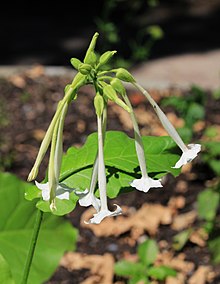Nicotiana sylvestris
| Nicotiana sylvestris | |
|---|---|
 |
|
| Scientific classification | |
| Kingdom: | Plantae |
| (unranked): | Angiosperms |
| (unranked): | Eudicots |
| (unranked): | Asterids |
| Order: | Solanales |
| Family: | Solanaceae |
| Genus: | Nicotiana |
| Species: | N. sylvestris |
| Binomial name | |
|
Nicotiana sylvestris Speg. & Comes |
|
Nicotiana sylvestris is a species of the genus Nicotiana, known by the common names woodland tobacco, flowering tobacco, and South American tobacco. It is a perennial plant in the tobacco genus Nicotiana.
The plant is native to the Andes region in Argentina and Bolivia, in South America.
The plant's leaves are simple, somewhat sticky, with the blade partially surrounding the stem, clasping petiole.
Flowers are produced on many-branched stems. The flowers are tubular, white, borne in racemes held above the foliage. Flowers can be over 7 cm long with a face 2 cm wide.
Each flower eventually produces a large quantity of small seeds. Their scent is strongest at night, to attract pollinating moths.
This plant is thought to be one of the parents of Nicotiana tabacum, the plant used in modern tobacco production.
Nicotiana sylvestris is cultivated as an ornamental plant. It is often planted in gardens for its scented flowers. It can be annual, biennial or perennial.
This plant has gained the Royal Horticultural Society's Award of Garden Merit.
...
Wikipedia
